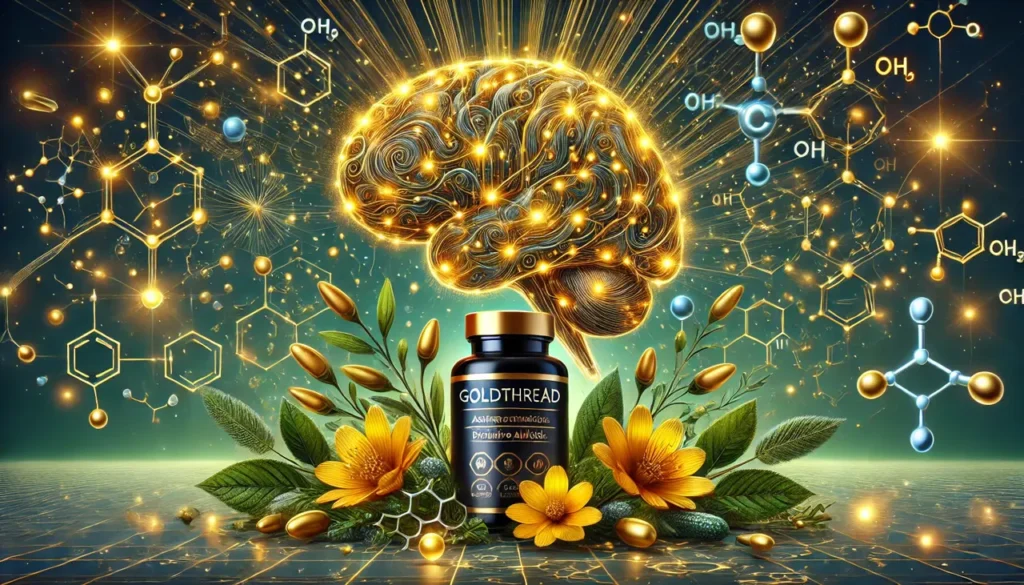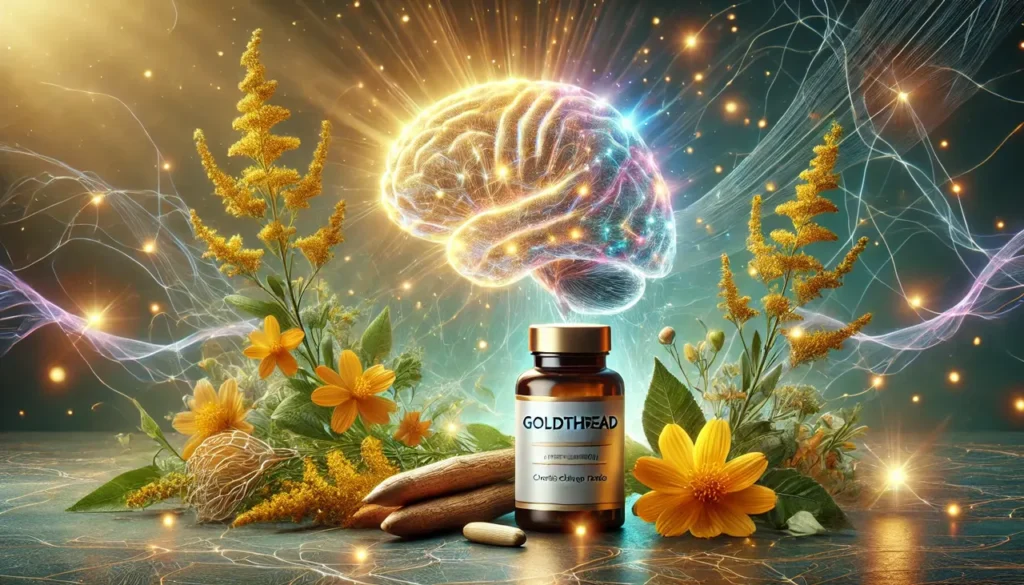Goldthread, scientifically known as Coptis chinensis, is a perennial herb that has gained attention for its potential nootropic benefits and traditional uses in herbal medicine. Commonly used in Traditional Chinese Medicine (TCM), Goldthread is recognized for its active alkaloids, which may contribute to various physiological benefits. This article aims to provide a comprehensive overview of Goldthread, focusing on its source, chemistry, physiological mechanisms, nootropic benefits, dosing guidelines, side effects, potential interactions with other supplements and medications, and considerations for individuals with specific health conditions.
You May Also Like:
Sources of Goldthread
Goldthread is native to the mountainous regions of China and is often found in moist, shaded areas. The herb is characterized by its yellow rhizomes, which contain the bioactive compounds responsible for its therapeutic effects. In TCM, Goldthread is traditionally used to treat various ailments, including digestive disorders, infections, and inflammation. Its nootropic potential is drawing increasing interest, particularly for its ability to support cognitive function.
Goldthread is typically cultivated in well-drained, loamy soil with partial shade. The harvesting of Goldthread involves digging up the rhizomes, which are then cleaned, dried, and processed for use in herbal preparations. Due to its growing popularity, Goldthread is now also available in supplement forms, such as capsules, powders, and tinctures.
Experience Enhanced Mental Clarity and Emotional Balance with Rhodiola Rosea—Shop Now on Amazon!

Chemistry of Goldthread
The primary active compounds in Goldthread are isoquinoline alkaloids, with berberine being the most prominent. Berberine’s chemical structure comprises a protoberberine skeleton with a quaternary ammonium ion, which contributes to its unique pharmacological properties. Its molecular formula is C20H18NO4, and it has a molecular weight of 336.36 g/mol.
Berberine is notable for its ability to cross the blood-brain barrier, allowing it to exert effects on the central nervous system (CNS). In addition to berberine, Goldthread contains other alkaloids such as coptisine and palmatine, which contribute to its pharmacological profile. These compounds interact with various receptors and enzymes in the body, leading to diverse physiological effects, particularly in metabolic processes and neurological function.

Physiological Mechanisms of Goldthread in the Body and Brain
The physiological effects of Goldthread, particularly its active component berberine, are attributed to several mechanisms of action:
- Neuroprotection: Berberine has demonstrated neuroprotective effects through its antioxidant properties, which help combat oxidative stress and inflammation in the brain. By reducing reactive oxygen species (ROS) and promoting cellular survival, berberine may protect neurons from damage associated with neurodegenerative diseases such as Alzheimer’s and Parkinson’s.
- Modulation of Neurotransmitter Systems: Goldthread has been shown to influence neurotransmitter levels, particularly serotonin and dopamine. Berberine can enhance the activity of certain neurotransmitter receptors, improving mood and cognitive function. This effect may be particularly beneficial for individuals experiencing cognitive decline or mood disorders.
- Regulation of Glucose Metabolism: Berberine is well-known for its ability to improve insulin sensitivity and glucose metabolism. This regulation could positively affect brain function, as optimal glucose levels are essential for cognitive performance. Improved metabolic health helps enhance brain energy availability, which is critical for maintaining focus and mental clarity.
- Anti-inflammatory Effects: Chronic inflammation is linked to various cognitive impairments and neurodegenerative conditions. Berberine exhibits anti-inflammatory properties by inhibiting pro-inflammatory cytokines and pathways, thereby reducing inflammation in the brain and supporting overall cognitive health.
Increase Focus, Reduce Stress, and Improve Brain Function with Panax Ginseng—Order Now on Amazon!

Nootropic Benefits of Goldthread
The potential nootropic benefits of Goldthread stem from its multifaceted effects on brain function. Although more research is needed, the following areas highlight its promise as a cognitive enhancer:
- Cognitive Enhancement: Goldthread may enhance cognitive function by improving memory, focus, and overall mental clarity. By promoting neuroprotection and reducing oxidative stress, berberine may support long-term cognitive health and reduce the risk of age-related cognitive decline.
- Mood Regulation: The modulation of neurotransmitter systems, particularly serotonin and dopamine, positions Goldthread as a potential ally in managing mood disorders. Enhanced mood and cognitive function can be especially beneficial for individuals experiencing depressive symptoms or anxiety.
- Fatigue Reduction: By improving glucose metabolism and increasing energy availability in the brain, Goldthread may help combat mental fatigue. This effect can be particularly useful in high-stress situations or for individuals facing demanding cognitive tasks.
- Neuroprotection Against Degeneration: The neuroprotective properties of Goldthread may aid in reducing the progression of neurodegenerative diseases. Research suggests that berberine may inhibit the formation of amyloid plaques, a hallmark of Alzheimer’s disease, indicating its potential role in preventing cognitive decline.
- Enhanced Learning Capacity: Goldthread may facilitate better learning by enhancing synaptic plasticity, which is crucial for forming new memories. By supporting the health of neurons and promoting the growth of new connections in the brain, Goldthread could help improve the ability to acquire and retain new information.
- Stress Resilience: Chronic stress can have detrimental effects on cognitive function. Goldthread may help improve resilience to stress by modulating the hypothalamic-pituitary-adrenal (HPA) axis, leading to better stress management and reduced cognitive impairment under pressure.
- Support for Neuroinflammatory Conditions: Goldthread’s anti-inflammatory properties can be particularly beneficial in addressing neuroinflammatory conditions, which are often linked to cognitive decline. By reducing neuroinflammation, Goldthread may contribute to improved cognitive function and a lower risk of neurodegenerative diseases.

Dosage and Supplementation Guidelines
When considering Goldthread as a nootropic supplement, it is essential to understand the appropriate dosages to achieve potential benefits while minimizing risks. The recommended dosages can vary based on individual needs, the form of the supplement, and the specific condition being addressed.
General Guidelines
- Standard Dosage: For general cognitive enhancement, dosages of Goldthread extract typically range from 300 to 600 mg per day. However, individuals should start at a lower dose to assess tolerance and gradually increase as needed.
- Berberine Dosage: When using berberine specifically, the commonly recommended dosage ranges from 500 to 1,500 mg per day, divided into two to three doses. This dosage has been supported by research demonstrating its efficacy and safety.
- Supplement Forms: Goldthread supplements are available in various forms, including capsules, powders, and tinctures. The choice of form may depend on personal preference, ease of use, and individual health considerations.
Timing and Administration
For optimal effects, Goldthread can be taken with meals to enhance absorption and minimize gastrointestinal discomfort. It is advisable to consult with a healthcare professional before starting any new supplement regimen, particularly for those with pre-existing health conditions or who are taking other medications.

Side Effects and Safety
Goldthread is generally considered safe for most individuals when used at recommended dosages. However, potential side effects and considerations should be noted:
- Gastrointestinal Issues: Some individuals may experience mild gastrointestinal disturbances, such as nausea, diarrhea, or abdominal discomfort, especially with higher doses.
- Dizziness or Lightheadedness: Due to its potential effects on blood pressure, some users may experience dizziness or lightheadedness. Monitoring blood pressure is advisable for those with hypotension.
- Allergic Reactions: Although rare, allergic reactions to Goldthread may occur. Symptoms can include skin rashes, itching, or swelling. Individuals with known sensitivities should exercise caution.
- Interactions with Other Supplements and Medications: Goldthread may interact with certain medications, particularly those that affect liver enzymes. Caution should be taken when combining Goldthread with:
- Antidepressants: Goldthread’s effects on serotonin may interact with selective serotonin reuptake inhibitors (SSRIs) or other antidepressants, potentially enhancing their effects and increasing the risk of serotonin syndrome.
- Blood Thinners: Due to its anti-inflammatory properties, Goldthread may have a mild blood-thinning effect. Individuals on anticoagulant or antiplatelet medications should consult their healthcare provider before use.
- Antidiabetic Medications: Berberine can lower blood sugar levels; therefore, individuals with diabetes or those taking antidiabetic drugs should monitor their blood sugar closely.
- Pregnancy and Lactation: The safety of Goldthread during pregnancy and lactation has not been extensively studied. As a precaution, pregnant or breastfeeding individuals should avoid Goldthread supplementation.
Risks for Individuals with Certain Health Conditions
While Goldthread is beneficial for many, certain health conditions may necessitate caution or avoidance of this supplement.
- Liver Disease: Berberine is metabolized by the liver, and individuals with liver disease may have impaired metabolism of Goldthread. High doses should be avoided unless under the supervision of a healthcare professional.
- Kidney Issues: Those with kidney disorders should also exercise caution, as the excretion of Goldthread’s active components may be compromised.
- Hypotension: Individuals with low blood pressure or those on medications for hypertension should monitor their blood pressure while using Goldthread, as it may enhance the effects of blood pressure-lowering medications.
- Autoimmune Conditions: Given its potential anti-inflammatory effects, individuals with autoimmune disorders should consult a healthcare provider before using Goldthread, as it may influence immune function.
Experience Calm, Heart Health, and Bone Strength with Magnesium—Shop Now on Amazon!

Conclusion: Should You Consider Goldthread as a Nootropic?
Goldthread, particularly its active component berberine, holds promise as a nootropic supplement due to its potential benefits for cognitive function, mood regulation, and neuroprotection. While research is still emerging, the available evidence suggests that Goldthread may support brain health and enhance cognitive performance.
However, as with any supplement, it is crucial to approach Goldthread with caution, particularly for individuals with pre-existing health conditions or those taking other medications. Consulting with a healthcare professional before starting Goldthread supplementation is advisable to ensure safety and efficacy.
In summary, Goldthread represents an intriguing option for individuals seeking to enhance cognitive function and support overall brain health. With its historical use in traditional medicine and its growing recognition in the realm of nootropics, Goldthread is worth considering for those interested in optimizing their cognitive abilities and mental clarity. By maintaining proper dosages and being aware of potential interactions and side effects, individuals can safely explore the benefits of this remarkable herb in their pursuit of enhanced cognitive performance.

References:
- Goldthread. Retrieved from: https://www.rxlist.com/supplements/goldthread.htm
- Significant differences in alkaloid content of Coptis chinensis (Huanglian), from its related American species. Retrieved from: https://pmc.ncbi.nlm.nih.gov/articles/PMC2744916/
- An Evidence-based Perspective of Coptis Chinensis (Chinese Goldthread) for Cancer Patients. Retrieved from: https://link.springer.com/chapter/10.1007/978-94-007-0526-5_6
Important Note: The information contained in this article is for general informational purposes only, and should not be construed as health or medical advice, nor is it intended to diagnose, prevent, treat, or cure any disease or health condition. Before embarking on any diet, fitness regimen, or program of nutritional supplementation, it is advisable to consult your healthcare professional in order to determine its safety and probable efficacy in terms of your individual state of health.
Regarding Nutritional Supplements Or Other Non-Prescription Health Products: If any nutritional supplements or other non-prescription health products are mentioned in the foregoing article, any claims or statements made about them have not been evaluated by the U.S. Food and Drug Administration, and such nutritional supplements or other health products are not intended to diagnose, treat, cure, or prevent any disease.


